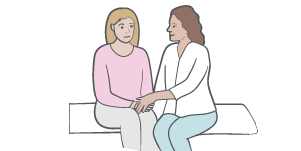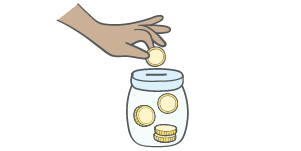fOSTERING aND yOUR oWN cHILDREN
Fostering when you have your own children can be a truly rewarding experience that the whole family can share. Not only does it provide children in care with other young people in the household to engage with, it can also develop the social skills of your own children. Many people rule out fostering if they have their own children (sometimes called ‘birth children’).
There is a myth that children in care are ‘naughty’ or ‘badly behaved’, and that this behaviour will be learned, or will affect, other young people in the household. The truth is, there is a very detailed matching process that occurs prior to a young person coming to live with you. This helps to ensure that fostering will be a positive experience for all members of your household.

“Having a child in the family helps new children to settle. I was definitely an ice breaker for each child as children naturally gravitate towards other children. It helped them see that I was loved equally to them and that they were a part of a family.”
Birth Child of A Foster Carer
The benefits for birth children
Fostering can have a profound and positive impact on your own children. It can teach them the value of sharing, both in terms of your parental time and their material possessions. It can teach them consideration, empathy, the importance of establishing relationships and can develop social skills.
Making a difference to another young person’s life can be something that your own children can feel proud of. Many birth children go on to become foster carers themselves because of the positive impact it has had on them.
From fostering enquiry through to approval and beyond, your own children will become a member of your fostering team – and their contribution will be priceless.
Here is a breakdown of the various fostering stages, and how your children will be involved:
Initial Application and Assessment
When you begin your fostering journey, you will be visited by a TACT Supervising Social Worker who will need to speak to all members of your household to ensure that everyone is on board with the decision to foster. This will include a consultation with your own children. It is important that your children are involved in all aspects of the application, as they will become an important part of your fostering ‘team’.
Your children will continue to contribute throughout the foster carer assessment process (called a ‘form F’) via our dedicated Workbooks and Activity Books, depending on your child’s age.
Activity Books (for children under 11)
For children under 11 years of age, we have two activity books. The first is completed during your fostering assessment, and is centred around recording any worries and apprehensions your children may have, as well as any positive thoughts about caring for children in your home.
The second workbook is for completion should you become an approved foster carer with us. It focuses on welcoming a new child into your home and how your children can help them settle in. There are exercises to encourage empathy, as well as opportunities for them to record their feelings.
My Family Fosters Assessment Workbook (for children over 11)
This is generally used with children over 11 years of age. The workbook contains a number of exercises to gather your children’s thoughts and highlight support networks. It also encourages completion of a journal.
The workbook can be completed at your child’s own pace, and will feed directly into the assessment process. It will also function as a valuable tool for your child to look back on once you become an approved foster carer.
Read more about your fostering journey.
Matching
When you are ready to begin fostering, your Supervising Social Worker will contact you about potential young people you could provide care for. Your social worker would have already taken into consideration a number of ‘matching’ factors such as:
• Your skills and experience as a foster carer
• The number of spare bedrooms you have (fostered children cannot share a bedroom with your birth children)
• The fact that you have your own children in the household (some children in care cannot be placed if there are other children in the household)
• The age(s) of your children
• Any specific needs of the young people, and how being placed with other children will affect them and your own children
If you and your household are happy with the ‘match’, you will be put forward as a potential foster carer for that young person. It is important to note that you will always have the final say.
First Steps and Beyond
In most cases, there is an introduction period. This is when the young person will visit your home, accompanied by someone from the fostering team. This gives both parties a chance to meet and evaluate if the fostering match should go ahead. As with all the other steps within the fostering process, it is important that your birth children are involved in all introductions.

“It has had a huge impact on the person I am today, making me more understanding and empathetic to people. I wouldn’t be the person I am now if my parents didn’t decide to foster.”
Birth Child of A Foster Carer
The benefits for children in care
Many young people requiring a foster home benefit hugely from other children in the fostering household. It could be that they needed to be placed away from their siblings, so having other young people in the household can be both therapeutic and a positive distraction. Other times it could simply be that they have someone closer to their own age that they can talk to, play with and even learn from.
Whatever their circumstances, birth children can help them feel welcome, help break the ice – and be a positive influence to help young people recover from any trauma they may have experienced.

Support For Your Own Children
Support for your own children is vital. Your own children play an important part in the fostering household.







